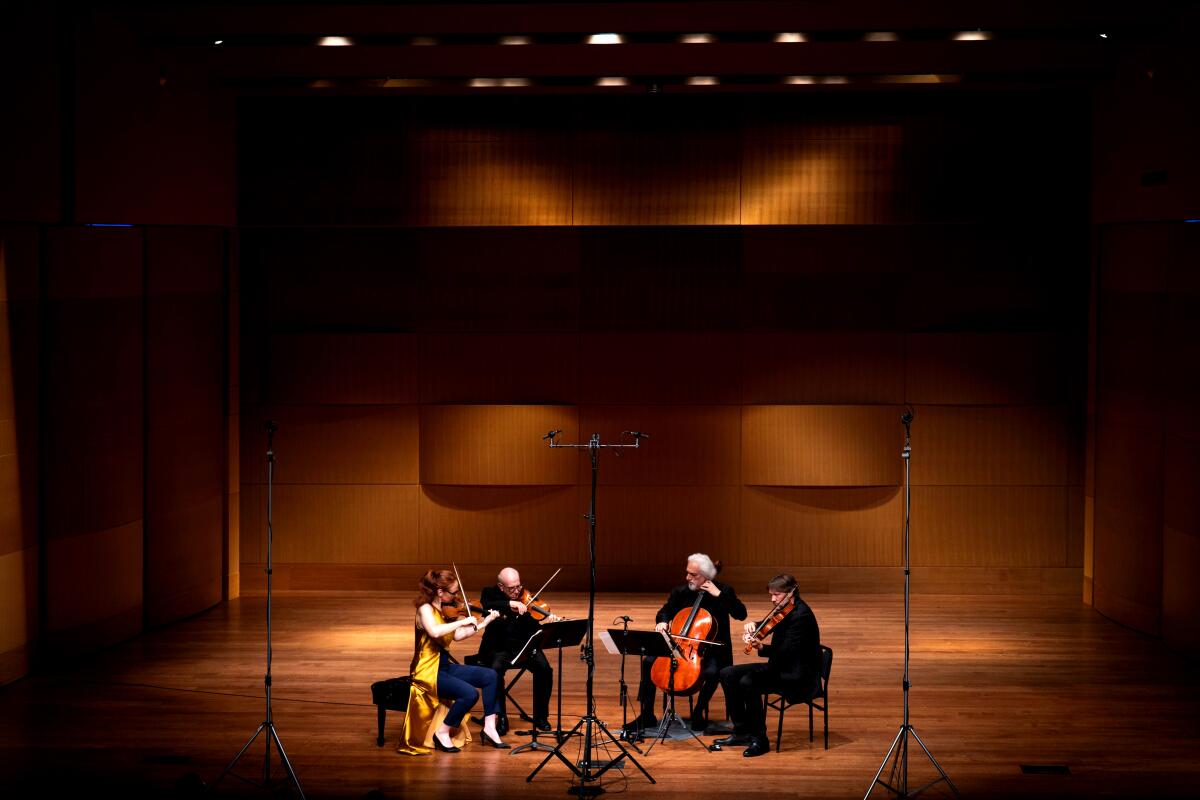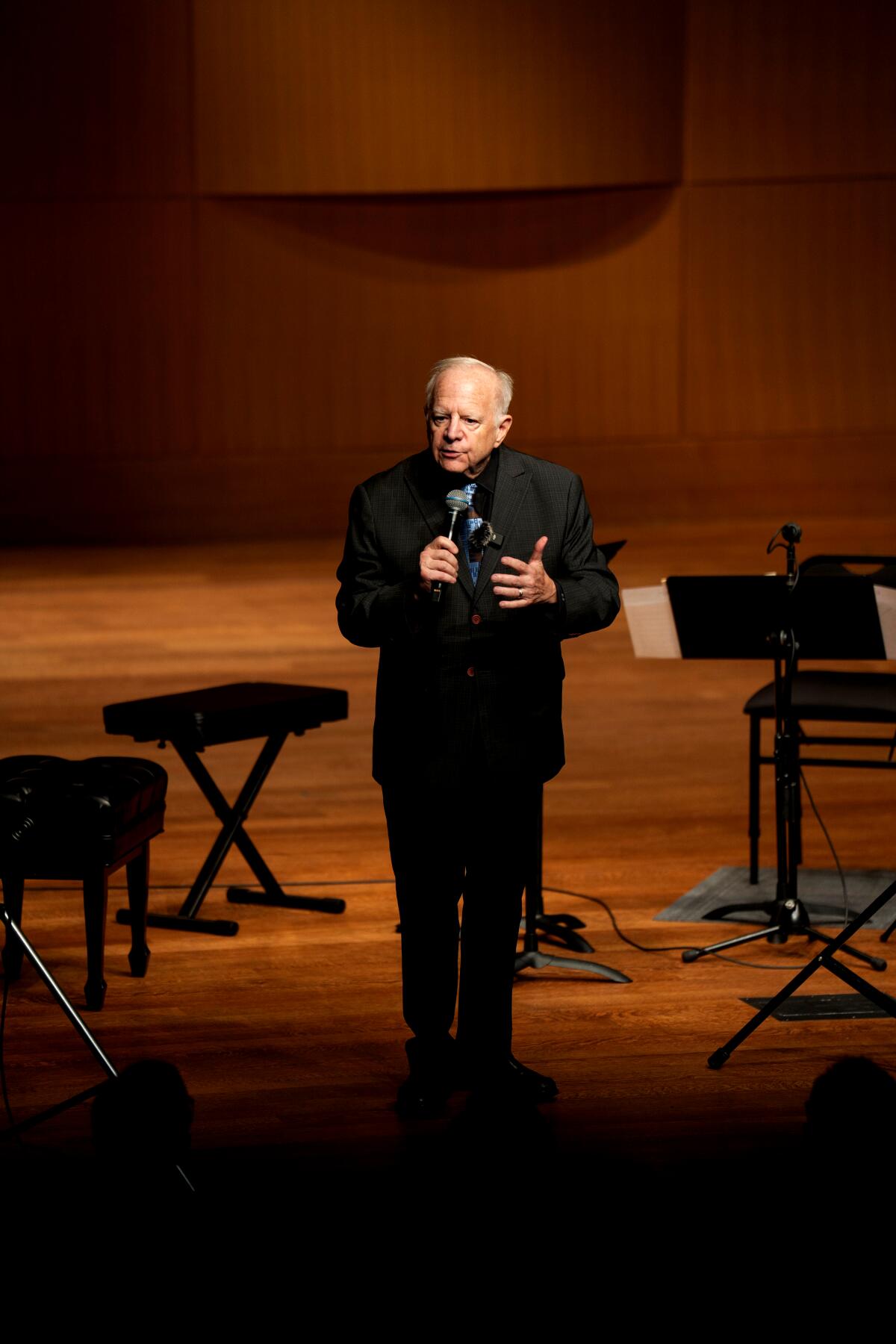At the Huntington, the New Hollywood String Quartet recalls legendary studio musicians

- Share via
When four top film studio musicians formed the Hollywood String Quartet in the late 1930s, its name was presumed an oxymoron. Exalted string quartet devotees belittled film soundtracks, while studio heads had a reputation for shunning classical music longhairs.
The musicians spent two intense years in rehearsal before disbanding when war broke out, and the quartet was brought back together in 1947 by two of its founders, Felix Slatkin (concertmaster of 20th Century Fox Studio Orchestra) and his wife, Eleanor Aller (principal cellist of the Warner Bros. Studio Orchestra). Oxymoron or not, Hollywood produced the first notable American string quartet.
Throughout the 1950s, the ensemble made a series of revelatory LPs for Capitol Records performing the late Beethoven string quartets and much else, while also joining Frank Sinatra in his torchy classic, “Close to You.” Everything that the Hollywood String Quartet touched was distinctive; every recording remains a classic.
The L.A. Phil opens a Hollywood Bowl season filled with Russian music as Thomas Sondergard conducts and pianist Kirill Gerstein performs Rachmaninoff and Prokofiev.
The legacy of the Hollywood String Quartet is a celebration of Hollywood genre-busting and also of string quartet making. Today, the outstanding Lyris Quartet is one of many outstanding string quartets who can be heard in the latest blockbusters. Another is the New Hollywood String Quartet, which is devoting its annual four-day summer festival to honoring its inspiration as it celebrates its 25th anniversary.
The quartet’s festival began Thursday night and runs through Sunday in San Marino at the Huntington’s Rothenberg Hall. The repertory is taken from the earlier group’s old recordings. And the concerts are introduced by Slatkin and Aller’s oldest son, who as a young boy fell asleep to his parents and their colleagues rehearsing in his living room after dinner.

The celebrated conductor Leonard Slatkin credits his vociferous musical appetite to his parents, who, he said Thursday, enjoyed the great scores written in this golden age of movie music and also championed new classical music as well as the masterpieces of the past. L.A. had no opera company in those days, and Slatkin said his parents likened film scores to modern opera scores.
Just about everyone has heard his parents in one film or another. Take “Jaws,” which is celebrating its 50th anniversary. That’s Aller’s cello evoking John Williams’ shark-scary earworm.
You’ve no doubt heard New Hollywood violinists Tereza Stanislav and Rafael Rishik, violist Robert Brophy and cellist Andrew Shulman on some movie. IMDb counts Brophy alone as participating on 522 soundtracks. You might also have heard one or more of the musicians in the Los Angeles Chamber Orchestra, Los Angeles Opera Orchestra or Los Angeles Philharmonic.

The New Hollywood’s programming may not encompass the original quartet’s range, but it is nonetheless a mixed selection of pieces that have somewhat fallen by the wayside, such as Borodin’s Second String Quartet. The original quartet’s performances and swashbuckling recording of the Borodin surely caught the attention of L.A. director Edwin Lester. In 1953 Lester created and premiered the musical “Kismet,” which adapts parts of the Borodin quartet, for Los Angeles Civic Light Opera, before it went on to be a hit on Broadway.
Times have changed and the New Hollywood brings a more robust tone and more overt interaction to its effusive interpretation compared with the silken and playful Slatkin and crew, who were all Russian-trained players. Hugo Wolf’s short “Italian Serenade,” which opened the program, was here lush and Italianate, while on an early 1950s disc it dances more lightly.
The big work was César Franck’s Piano Quintet. Slatkin noted that the recording, released in 1955, didn’t sell well, probably thanks to the album cover’s saturnine painting of a composer that few would recognize. Slatkin also noted that his parents weren’t enamored of their performance, but then again, he explained that they were temperamentally ever ready to find fault.
That recording, which features his uncle, Victor Aller, a graceful pianist, is slow and commanding. Jean-Yves Thibaudet was the right guest in every way for the big-boned performance at the Huntington. He is a French pianist with a flair for German music, well suited for the Belgian French composer’s Wagner-inspired score.
Thibaudet is also a longtime L.A. resident and an especially versatile performer who happens to be featured on the new soundtrack recording of Dario Marianelli’s “Pride & Prejudice,” which tops Billboard’s classical and classical crossover charts. He and Slatkin also go back decades, having performed together and become such good friends that the conductor turned pages for him in the Franck.
Los Angeles County Museum of Art previewed its new building not with paintings but with music, just as it did in 1965. A night of jazz kicks off a new era for LACMA.
Seeing the 80-year-old Slatkin onstage evoked a remarkable sense of history, reminiscent of the roots to L.A.’s musical openness that his parents represented. On my drive home Thursday, I couldn’t resist following the route Albert Einstein would have taken after practicing his violin when he lived a 12-minute bike ride away during his Caltech years — the time Slatkin’s parents were making music history at the studios. Like them, Einstein played with the L.A. Philharmonic (although invited once not because he was a good violinist but because he was Einstein).
The New Hollywood and Thibaudet made no effort to relive the past in Franck’s quintet. Instead, in their opulence and expressive explosiveness, they showed Hollywood how to produce a remake that’s magnificent.
In the meantime, Leonard Slatkin, who is a former music director of the L.A. Phil at the Hollywood Bowl, returns later this month to the venue where his parents met in 1935 at a Hollywood Bowl Symphony competition. He will conduct a July 24 program that includes a recent work by the next generation of Slatkins. His son, Daniel, is a film and television composer.
More to Read
The biggest entertainment stories
Get our big stories about Hollywood, film, television, music, arts, culture and more right in your inbox as soon as they publish.
You may occasionally receive promotional content from the Los Angeles Times.













